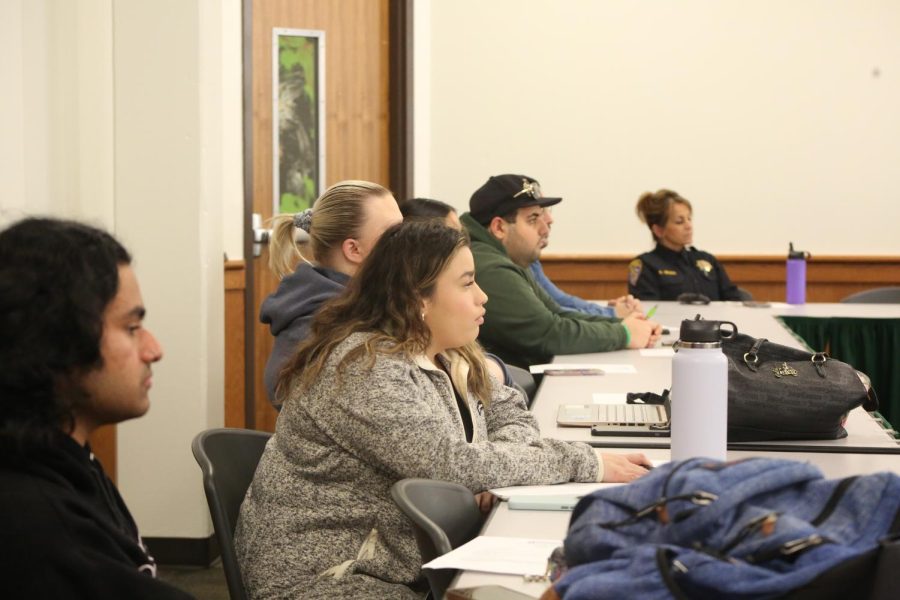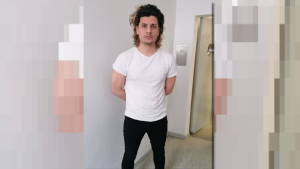Navigating the aftermath of a sexual assault, how to report
Campus police, survivors share reporting procedures
Committee members focus on the personal story of a survivor at the ASI Wellness, Safety and Sexual Assault Awareness Committee in the Union’s Summit Room Thursday, March 30, 2023. The meeting allowed for presenters to discuss sexual assault awareness and highlighted campus resources along with the process of reporting assault.
April 1, 2023
With ongoing problems of sexual assault at Sacramento State, understanding ways to cope with its aftermath and options on how to report an assault is more important than ever for students.
RELATED: Sac State support plan seeks to spread sexual assault prevention awareness
The following steps were explained in a Sac State Wellness, Safety, and Sexual Assault Awareness Committee meeting, led by Associated Students Inc. and held in the University Union Summit Room Thursday afternoon.
Supporting survivors and managing your own triggers
Tamara Dunning, a survivor and professional registered parliamentarian for Sac State, elaborated on steps other survivors can take after an assault to support themselves.
“You need to know what happened to someone like me,” said Dunning. “It is uncomfortable but it’s important to understand someone who has been sexually assaulted.”
Dunning said having a support system is crucial. For her, it was a close friend named Lorenzo Cuesta. Friends like Cuesta, she said, helped her fight through her trauma.
Cuesta elaborated that in order to support someone through an assault, it’s important to understand their triggers.
“If a sexual assault survivor finds something that gives them panic attacks, as a real supporter you should provide a barrier for them,” said Cuesta.
For those who may not have a support system, Dunning said the wellness committee is always open to provide a safe space.
“We can help you through it. We are here for you so that survivors know they are not alone,” Dunning said. “That is one of the worst feelings of sexual assault is extreme isolation because who is going to understand it?”
When it comes to managing triggers, Dunning said it helps her to surround herself and practice three steps: to change the subject, find something positive to distract herself with and physical touch with a person she’s comfortable with.
Other coping skills can include ground techniques and reaching out to therapeutic resources like the Rape, Abuse and Incest National Network at 800-656-HOPE (4673).
Reporting and investigating an assault
Sac State Officer Kim Mojica presented the procedure and process of reporting a sexual assault as well.
Mojica said reporting a sexual assault is a hard process for students, but it’s important to report the incident as soon as possible and thoroughly describe the perpetrator.
In order for an investigation to be built, Mojica said survivors need to be acquainted and direct about the assault, which includes detailing the assault step by step.
“It’s not to embarrass, blame or make [survivors] feel horrible,” Mojica said. “It’s to get details in order to build an investigation, which means I need to know what the perpetrator did step by step.”
Mojica said the process is in collaboration with The Sutter Medical Foundation’s Bridging Evidence Assessment and Resource Center. This organization specializes in preserving evidence that may be on the person themselves, clothing or any object related to the assault.
“We don’t want to lose evidence because if a survivor in the moment doesn’t want to prosecute and we lose the evidence there is nothing to support the story and eventually arrest the perpetrator,” Mojica said
Mojica specified the police don’t force individuals to turn over evidence or force sexual assault survivors to prosecute.
Survivors also have a chance to speak with the department confidentially if it makes them more comfortable, Mojica said. She also said if a perpetrator knows the residence of a survivor, Sac State PD will communicate with student housing to relocate the survivor.
An assault should be directly reported to Sac State PD’s office or a confidential advocate, Mojica said. Additional support for survivors is also offered through WEAVE, a third-party organization specializing in helping those impacted by sexual assault.
Through WEAVE, students can file a report with the Office of Equal Opportunity. The form includes how to contact the survivor, the date of the assault and any other information on the individuals involved.
WEAVE can be reached at (916) 278-5850 or by email at WEAVE@csus.edu. To speak to an advocate directly, WEAVE has a 24 hour hotline at (916) 920-2952. The Office of Equal Opportunity can also be reached at (916) 278-5770 or at equalopportunity@csus.edu. Their in-person office is located in room 2005 on the second floor of Del Norte Hall.







































































































































